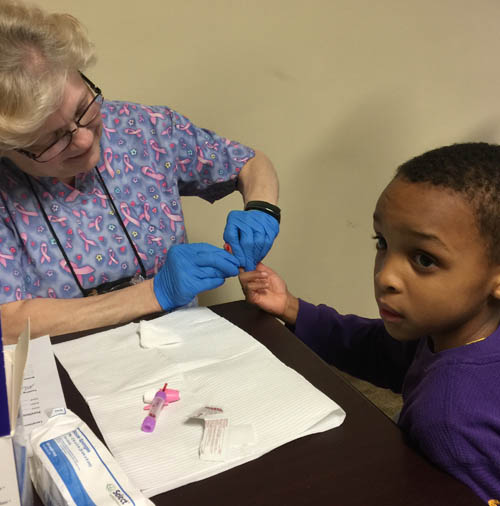Not waiting for government, philanthropy steps up to help Flint
Flint’s recovery received a welcome jolt today, as 10 foundations based in Michigan or with roots here announced a charitable gift of up to nearly $125 million, with most support connected to Flint’s ongoing water crisis.
Far from another bottled-water donation, the foundations vowed to support programs in such areas as early childhood education, health interventions for residents exposed to high lead levels, and economic development in this long-struggling city.
Up to $100 million of the gift will come from the hometown Charles Stewart Mott Foundation, the philanthropies said in a press release.
“Flint’s water crisis is far from over,” Ridgway White, Mott’s president, said in the release. “While some funds and services have been provided, we’re still waiting for the state and federal governments to step up, replace damaged infrastructure and make long-term commitments to the health and education of children.
“Today our foundations are stepping in to help. We envision a vibrant Flint with a robust economy, dynamic culture, and healthy, thriving residents, and we’re committed to achieving these goals.”
The foundations (see complete list in box) are among the biggest and most prominent in Michigan. Besides Mott, they include the W.K. Kellogg Foundation, The Kresge Foundation, the Ford Foundation and The Skillman Foundation (Disclosure: Kresge, Kellogg, Mott and Ford have all offered financial support to The Center for Michigan or Bridge Magazine).
The Flint gift marks the second time in recent years that heavyweights in the nonprofit sector have contributed a substantial cash infusion to correct, or try to correct, a crisis caused at least in part by government.
In 2014, the so-called “grand bargain” saved the Detroit Institute of Arts’ collection from liquidation and was a major factor in the ultimate resolution of that city’s bankruptcy proceedings. In that case, foundations led an effort that grew to include the state of Michigan and private donors in raising $800 million to protect both the art and the pensions of Detroit’s retirees.
In Flint, a task force appointed by Gov. Rick Snyder concluded in March that government failure, mostly at the state level, was to blame for the disastrous decision to switch the city’s water supply from treated water long supplied by Detroit’s water system to the more corrosive Flint River in 2014, in part to save money. Failure to properly treat the river water resulted in lead leaching into residents’ drinking water. Lead is a neurotoxin that can inflict irreversible brain damage, particularly in young children.
In an interview Wednesday with Bridge, White said the Flint grant is not intended to do government’s work for it.
“We want to create a narrative of hope,” White said. “We don’t feel we’re replacing government dollars. You can’t prescribe a pill for lead poisoning, but you can prescribe good nutrition and good education.
“Some things, like fixing the water infrastructure, are clearly government’s responsibility. There is opportunity to show how philanthropy can complement government and fill a void. But we’re not going to replace pipes,” White said.
In broad strokes, the foundations said their gift would focus on six targeted areas:
Safe drinking water, including ongoing, independent water testing. Experts will develop modern, integrated management of drinking, storm and wastewater. The foundations did not not mention in the statement which experts they were referencing, or whether they would seek water experts outside of government. Water experts in Flint and state government absorbed much of the blame for the Flint crisis.
Family health, including a dollar-for-dollar match of up to $5 million in donations made to the Flint Child Health & Development Fund through the end of 2016. Dr. Mona Hanna-Attisha, the pediatrician who helped bring the seriousness of the water crisis to public attention, established the entity at the Community Foundation of Greater Flint. The fund will provide support over the next 20 years for interventions for Flint children exposed to lead.
Early childhood education, so that young children in Flint can be admitted to Early Start, Head Start and Great Start Readiness programs.
Improving the city’s nonprofit sector, which the foundations said have been challenged by early response to the crisis.
Community engagement, through promotion of civic engagement and local decision-making.
Economic development, to attempt to correct the damage done to the city’s businesses by the water crisis. The foundations said this will include job training and entrepreneurship.
Rob Collier, president and CEO of the Council of Michigan Foundations, said the collaboration was intended to answer the question, “How can it be a strategic partner and leverage its resources to make sure the issues are addressed?”
“Are we doing what government should be doing? I would argue we’re not,” Collier said. “But we’re using our resources to enhance what government can do.”
Philanthropy always responds to natural disasters, Collier said, and while Flint’s was man-made, he said the foundations are playing a familiar role.
“What makes this one unique is the fact it has to have a long-term horizon because of the issue of lead,” and its lingering effects on those who ingested it. Normally disaster relief is accomplished on a shorter timeline, but Flint’s could have “a 20-year horizon,” Collier said.
White, of Mott, told Bridge that the aid will not just be money and support, but intangible help as well. “I think it really shows that the citizens of Flint are not alone,” White said. “The rest of the nation cares about Flint, and we will not be neglected.”
Both Collier and White said the foundations were positioning themselves as an influential partner not only in the city’s immediate recovery, but in its future as well, as indicated by the emphasis on economic development.
“There are short-term, intermediate and long-term needs,” Collier said.
The press statement indicated other partners will soon join the partnership, but offered no timeline or indication of who they might be. The statement did not go into detail on what conditions would have to be met for the various philanthropies to contribute the full $125 million.
The Mott Foundation has been heavily involved in helping to resolve the Flint crisis since the full extent of the problem was finally made public late last year. Mott picked up one-third of the $12 million cost of switching the city back to treated Detroit water last fall, though the water still is not yet safe to drink without a filter. In April, White wrote in Philanthropy News Digest, “Our decision to help pay for the switch was a no-brainer. ...We couldn't sit on the sidelines while the children of Flint were being harmed. Our role as a catalyst for the return to safer water speaks to one of philanthropy's most valuable attributes: the ability to respond swiftly when disaster strikes to help people meet their basic needs. But after taking swift action, the question then becomes ‘What next?’
Later in the same piece, he wrote, “We firmly believe the state of Michigan and the federal government must provide the resources – financial and otherwise – needed to address the harm caused. There's little doubt that any government restitution Flint receives will fall far short of what will be needed to address long-term health, infrastructure, and economic concerns. That's all the more reason we must call on state and federal government to provide maximum resources to Flint. And it's partly why we haven't rushed to make subsequent commitments. We don't want government officials to think it's okay to send fewer dollars to Flint.”
See what new members are saying about why they donated to Bridge Michigan:
- “In order for this information to be accurate and unbiased it must be underwritten by its readers, not by special interests.” - Larry S.
- “Not many other media sources report on the topics Bridge does.” - Susan B.
- “Your journalism is outstanding and rare these days.” - Mark S.
If you want to ensure the future of nonpartisan, nonprofit Michigan journalism, please become a member today. You, too, will be asked why you donated and maybe we'll feature your quote next time!


 Ridgway White is president of the Flint-based Charles Stewart Mott Foundation.
Ridgway White is president of the Flint-based Charles Stewart Mott Foundation. JaMise Wash-Lang of Flint, took her son JaCarie, 5, to get a blood test in February. (Bridge photo by Chastity Pratt Dawsey)
JaMise Wash-Lang of Flint, took her son JaCarie, 5, to get a blood test in February. (Bridge photo by Chastity Pratt Dawsey)